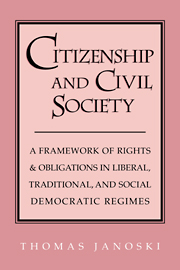 Citizenship and Civil Society
Citizenship and Civil Society Book contents
- Frontmatter
- Contents
- List of Figures and Tables
- Acknowledgments
- 1 Introduction to Citizenship
- 2 The Framing of Citizenship Rights: Expansion, Clarification, and Meaning
- 3 Reconstructing Obligations and Patriotism: Limitations, Sanctions, and Exchange in a System of Rights
- 4 Citizen-Selves in Restricted and Generalized Exchange
- 5 The Balance of Rights and Obligations through Nesting, Civil Society, and Social Closure
- 6 Incremental Change in Citizenship over Decades: Power Resources, State Structures, Ideology, and External Forces
- 7 Momentous Change in Citizenship over Centuries: From Wasps to Locomotives in the Development and Sequencing of Rights
- 8 Conclusion and Implications
- Notes
- References
- Subject Index
- Name Index
8 - Conclusion and Implications
Published online by Cambridge University Press: 05 June 2012
- Frontmatter
- Contents
- List of Figures and Tables
- Acknowledgments
- 1 Introduction to Citizenship
- 2 The Framing of Citizenship Rights: Expansion, Clarification, and Meaning
- 3 Reconstructing Obligations and Patriotism: Limitations, Sanctions, and Exchange in a System of Rights
- 4 Citizen-Selves in Restricted and Generalized Exchange
- 5 The Balance of Rights and Obligations through Nesting, Civil Society, and Social Closure
- 6 Incremental Change in Citizenship over Decades: Power Resources, State Structures, Ideology, and External Forces
- 7 Momentous Change in Citizenship over Centuries: From Wasps to Locomotives in the Development and Sequencing of Rights
- 8 Conclusion and Implications
- Notes
- References
- Subject Index
- Name Index
Summary
Novel, important and true ideas are rare. Such ideas which are then developed into a coherent theory are even scarcer. T. H. Marshall is one of very few to have had at least one such idea, and to develop it. That is why it is important to understand and to improve upon his theory of citizenship.
Michael Mann (1988, p. 188)Citizenship shows renewed vitality as a “novel” idea that needs theoretical development. Nations are extending citizenship to increasing numbers and percentages of people within national boundaries, and social scientists are using citizenship theories to explain this movement. As Michael Walzer states (1983, p. 31), “the primary good that we distribute to one another is membership in some human community” and with increasing frequency that “membership” is citizenship in a country. Academic interest has increased in the area of citizenship, and much more is being written using this concept, although little effort has focused systematically on social science theory. This book has taken the confusing welter of materials burgeoning in the area of citizenship and put them into a theoretical framework that is both coherent and capable of being operationalized. In so doing, it has also provided a theoretical foundation for three regime types, which have been previously grounded in left-right distinctions, or in a political theory format of liberalism, communitarianism, and expansive democracy. Each regime type with its characteristic theory has different constraints and accomplishes different things.
- Type
- Chapter
- Information
- Citizenship and Civil SocietyA Framework of Rights and Obligations in Liberal, Traditional, and Social Democratic Regimes, pp. 217 - 236Publisher: Cambridge University PressPrint publication year: 1998


